About Your Body
by Vanessa Rusci
About Your Body – Self-Portrait, Body, and Digital Sharing
Vanessa Rusci’s work has always inhabited a threshold zone, where photography ceases to be a simple tool of recording and becomes an instrument of knowledge, performance, and social practice.
Her research does not limit itself to representing the body: it stages it, exposes it, interrogates it, until it becomes political terrain and a language of emancipation. Within this journey, About Your Body represents a fundamental, perhaps the most complex and layered, stage — because it is able to intertwine twenty years of investigations on the nude with the dynamics of digital life and social media sharing.
Origins and Context
The project began in 2014, from a long series of self-portrait workshops designed exclusively for women. In those sessions, the artist invited participants to look at themselves without filters, to photograph themselves, to turn the act of self-portraiture into a conscious gesture. This was not phototherapy, but rather “conscious photography”: the camera as a mirror, a tool to recognize oneself outside of imposed aesthetic models.
This practical experience finds deep roots in Rusci’s personal and artistic history: since 1996 she has worked on the nude and the female body. Projects such as Sign (2000), Fate (2001), Ana (2004), So Ugly (2006), Concrete (2010) anticipated many of the reflections in About Your Body: the relationship between aesthetics and violence, between image and identity, between eroticism and liberation.
Body as Language, Photography as Transformation
At the heart of About Your Body lies self-portraiture. Photographing herself nude, in lingerie, in provocative or erotic poses, during everyday actions such as cooking or exercising, became a way to reclaim the body from objectification and return it to herself as an active subject.
Each image is both intimate and political: an act of care and resistance. Photography here is not representation but a transformative practice. It does not merely document, but modifies: it questions the ideal image, dismantles the cage of aesthetic models, and exposes the contradictions between vulnerability and emancipation.
Eroticism and sexual freedom, so often reduced to clichés in the media, become central elements of an artistic reflection that restores to desire its political power.
The Challenge of Social Networks
What makes About Your Body radical is not only the content, but the context. Vanessa Rusci chose to bring the project into the space of social networks, which she calls a “wild west” of anonymous gazes, judgments, and algorithms. Exposing her own body in this uncontrolled environment meant breaking the boundaries of the traditional art space and exposing herself to risks of misinterpretation, attack, or censorship.
But it is precisely this exposure that makes the work a continuous and interactive performance. Through Instagram and Facebook, the artist transforms sharing itself into an artistic gesture: the images do not only live on paper or on the walls of a gallery, but within the unstable public arena of the digital.
The body thus becomes both medium and message, a presence that interrogates the community and invites women to break silence and reclaim their image.
From Self to Collective
If the beginning is intimate and autobiographical, About Your Body soon opens to the collective dimension. Through shootings and workshops, women aged 18 to 60 chose to pose nude or in lingerie, to narrate themselves through their own bodies.
This created a choral archive, in dialogue with the body positive movement and human rights struggles. The project intersects with Noi Social 4 Women (2016), a social net art initiative dedicated to the prevention of gender-based violence and the reintegration of survivors.
The two experiences converge on the idea that artistic communication can go beyond clichés (bruises, blood, redundant slogans) to become a generator of hope and tools for rebirth.
Exhibitions, Performances, Cross-Pollinations
Over the years, About Your Body has taken many forms:
-
Exhibitions in London, Geneva, and Arezzo.
-
Performances such as A Gift for You (Geneva, 2017), where the artist photographed 250 women in public space, giving each a portrait as the start of a dialogue.
-
Collaborations with international curators and galleries.
-
Online and printed publications.
From this cycle of self-portraits and workshops also grew the Secessione project (2020), which marked an aesthetic and conceptual turning point: an explicit dialogue with Klimt and the representation of women as fatal, consoling, vengeful, but above all emancipated figures. Here color and aesthetics take center stage, transforming the diary into artistic vision.
Meaning and Relevance
After more than twenty years of work on the body and the nude, About Your Body stands today as a visual and political diary, a living archive that continues to interrogate the relationship between body, image, and society. It is an invitation to look at oneself without filters, to recognize one’s own beauty as an act of resistance, to break the illusions of media narratives.
The legacy of the project lies not only in the images produced but in the experience itself: in the courage to expose oneself, in the act of bringing the body into digital space, in the possibility of turning sharing into both artistic and political practice.
The question that About Your Body leaves open is crucial: what does it mean to expose one’s body in the time of social networks? And how can this exposure become collective emancipation rather than further objectification?
Author’s Note
When I began About Your Body I did not fully know what I was doing. But I knew I would be attacked. Psychologists, artist friends, curators were watching me: I was aware that what was happening would not go unnoticed.
The attacks did come, and they were harsh. It was not yet the time of OnlyFans: exposing oneself in that way on the web meant declaring that you were looking for sex, or that you were crazy. It was not clear that this was an art project. I was attacked by feminists, by bodybuilders, by friends who thought I had lost my mind. On social media, people look more than they read: sometimes I provoked, sometimes I denounced, sometimes I justified myself.
I had never been explicitly erotic in my photography, but I was learning that I liked eroticism. I had always been sexually free and nonconformist, and with this project I chose to push further. There was the artist doing research, but there was also the human being exposing herself. I enjoyed seeing myself in the photographs, liking myself through filters, lenses, angles. I also enjoyed being seen, showing myself.
Perhaps I wanted to understand why we need to show ourselves so much. Perhaps, I tell myself today, because society has long silenced and crushed women: this practice of exposure gave us the illusion of visibility denied elsewhere.
The greatest accusation I received was that of narcissism. The selfie was branded as a narcissistic act, but I believe the opposite: sharing is an anti-narcissistic gesture, because it breaks closed intimacy and makes it communal.
I was accused of being crazy, but only when the project moved from catalogues and galleries to social networks. Social sharing confuses boundaries, and then the work was no longer “art” but “madness.” I lived moments of great tension and anxiety, but I wanted to study social media, to understand it, and above all to use it as a tool of female emancipation.
The project had a strong resonance especially among women, but not only. I also received countless images of male genitals and sexual proposals. I was not shocked, nor did I feel diminished: it was simply proof of male hypocrisy. Many who wrote were married men, partners, fathers.
About Your Body was all of this: exposure, conflict, provocation, attack, and resistance. A laboratory of freedom, inside and outside myself.
On Sharing Through Social Media
At a certain point, I felt an incredible, almost compulsive need to share. I was living it with unease, unable to tell the boundary between the project and my life.
As personal catharsis
For me, photography was an act of survival, and immediate sharing on social media became a way to put out what I carried inside without filters, not to hold it back, to lighten myself. Posting instantly was therapeutic, like writing a diary but in front of the world.
As artistic and political choice
I did not want to wait for exhibitions, catalogues, the long timelines of official art: sharing immediately meant breaking mediation, accepting risk, and placing my body into the unstable and anonymous space of the digital. It was my way of testing real-time reception, the fragility and strength of instant visibility.
As a sign of our time
We live in a society that constantly pushes us to share: selfies, stories, fragments of life. I took that collective drive and turned it into art, using it not as vanity but as a tool of reflection on identity and the female body.






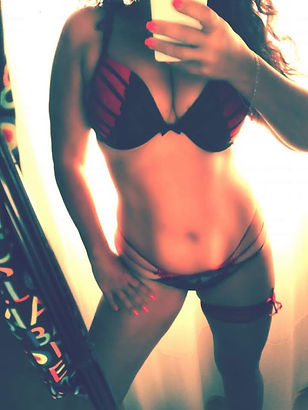

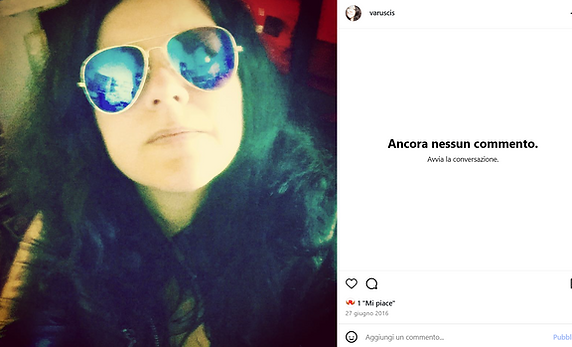
About Your Body was this: a personal and collective archive of images and reflections, born from an act of resistance and catharsis, which became a universal invitation to look at oneself without shame, to rediscover beauty as an act of freedom.
These two images mark its beginning. The rest is still to be told. The project developed for a long time on Instagram @varuscis — now a women-only page, closed to men — and on my Facebook page Vanessa Rusci.
Later, I opened @aboutyourbody_varu to publish more material and to make it clear that this was an artistic project, something that had previously not been deliberately specified.
The hashtags I used were many, and unfortunately with Instagram’s algorithm changes it is not easy to reconstruct them all. But I am trying.
#aboutyourbody
#aboutyourbodybyvary
#aboutyourbodyvanessarusci
#noisocial4women
— certainly the most used.






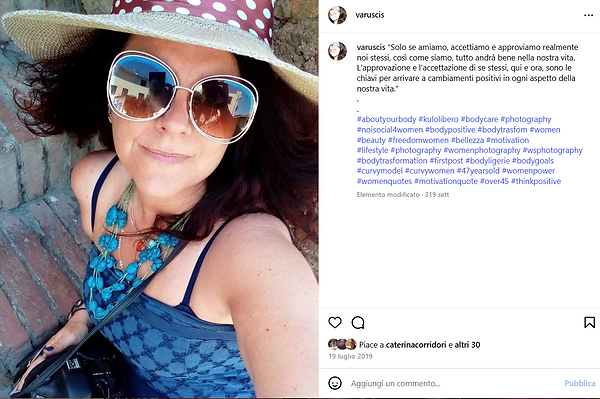
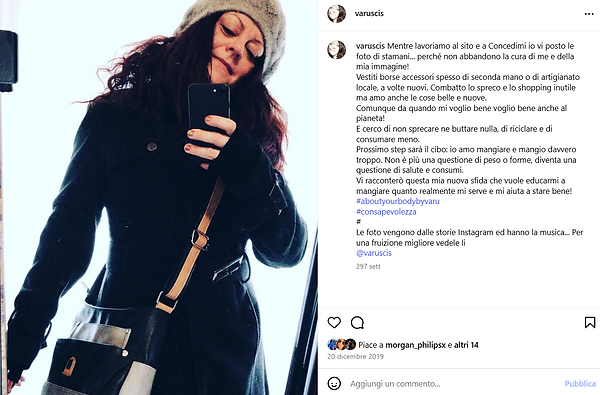








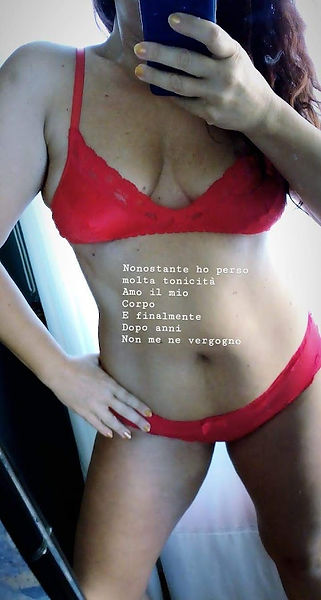
Work in Progress
About will become a book, an archive.
Updated September 2025







